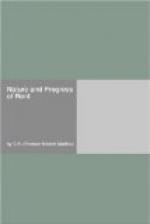Is it not, on the contrary, a clear indication of a most inestimable quality in the soil, which God has bestowed on man — the quality of being able to maintain more persons than are necessary to work it? Is it not a part, and we shall see further on that it is an absolutely necessary part, of that surplus produce from the land,(9) which has been justly stated to be the source of all power and enjoyment; and without which, in fact, there would be no cities, no military or naval force, no arts, no learning, none of the finer manufactures, none of the conveniences and luxuries of foreign countries, and none of that cultivated and polished society, which not only elevates and dignifies individuals, but which extends its beneficial influence through the whole mass of the people?
In the early periods of society, or more remarkably perhaps, when the knowledge and capital of an old society are employed upon fresh and fertile land, this surplus produce, this bountiful gift of providence, shows itself chiefly in extraordinary high profits, and extraordinary high wages, and appears but little in the shape of rent. While fertile land is in abundance, and may be had by whoever asks for it, nobody of course will pay a rent to a landlord. But it is not consistent with the laws of nature, and the limits and quality of the earth, that this state of things should continue. Diversities of soil and situation must necessarily exist in all countries. All land cannot be the most fertile: all situations cannot be the nearest to navigable rivers and markets. But the accumulation of capital beyond the means of employing it on land of the greatest natural fertility, and the greatest advantage of situation, must necessarily lower profits; while the tendency of population to increase beyond the means of subsistence must, after a certain time, lower the wages of labour.
The expense of production will thus be diminished, but the value of the produce, that is, the quantity of labour, and of the other products of labour besides corn, which it can command, instead of diminishing, will be increased. There will be an increasing number of people demanding subsistence, and ready to offer their services in any way in which they can be useful. The exchangeable value of food will, therefore, be in excess above the cost of production, including in this cost the full profits of the stock employed upon the land, according to the actual rate of profits, at the time being. And this excess is rent.
Nor is it possible that these rents should permanently remain as parts of the profits of stock, or of the wages of labour. If such an accumulation were to take place, as decidedly to lower the general profits of stock, and, consequently, the expenses of cultivation, so as to make it answer to cultivate poorer land; the cultivators of the richer land, if they paid no rent, would cease to be mere farmers, or persons living upon the profits of agricultural stock. They would unite the characters of farmers and landlords — a union by no means uncommon; but which does not alter, in any degree, the nature of rent, or its essential separation from profits. If the general profits of stock were 20 per cent and particular portions of land would yield 30 per cent on the capital employed, 10 per cent of the 30 would obviously be rent, by whomsoever received.




